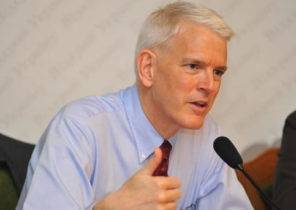In the Czech historiography of unfolding sometimes heated debate on the subject of what was Czechoslovakian, but rather Eastern European communism (“state socialism”), was it the totalitarianism or dictatorship. And, as a rule, this argument is only a belated echo of the weighted German, and sometimes French or Anglo-Saxon debate. However, in the Czech Republic (and not only) in the course of such disputes is ignored then a geopolitical reality, because the real Autonomous Czechoslovak or East European communism did not exist… you can’t seriously think about the so-called Eastern bloc, say, the daily life of its population, abstracting from the role of the Soviet Union as its hegemon.
In Western Europe, some scientists, including sociologists and representatives of other humanitarian spheres, considering the colonial-Imperial role of their country in the framework of postcolonial studies. In this context, a legitimate approach to the analysis of colonial relations between the Soviet Union and its Eastern European satellites with limited sovereignty. Recently deceased American historian Philip Curtin, an expert on the history of Africa, gave a pretty simple definition of colonialism, describing it as “dominated by people with a different culture”.
The same can be seen in the relations between the Soviet Union and Czechoslovakia. If we discard ethnic-linguistic talk about some fateful affinity of the Slavs and look at the history of the Czechs and the Russian, it becomes clear that these are two people from different cultural and civilizational areas of… the Czechs being a people traditionally Western, experienced together with other parts of the West, the General boom of the middle ages, Renaissance and reformation, the cycle is diverse, as well as education and civil emancipation. Russian or absolutely not involved in these processes, either only a small part of the Russian elites tried to imitate… But the Russian Empire mimic Europe, and the most dangerous manifestation of this was the Soviet-Russian perception of communism that formed in the so-called Marxist-Leninist ideology.
The German historian jürgen Osterhammel, which is the so-called global history, not so long ago tried to clarify the definition of colonialism: between the colonizer and the colonized, reigns a profound alienation. Also colonizer arrogates to itself the right to interpret these relationships, their past, present and future. Of course, we would have found some evidence that the Czechs, Slovaks, poles, Hungarians and Lithuanians (that is, their intellectual elite) that looked at relations with the Soviet Union, considering them a new form of Russian imperialism. However, the tragedy of these traditionally Western Nations (the West is not a geographical category, and civilization!) was the fact that their colonial capital city was not a centre of modernization and emancipation, and was a compared to them backward the item and carried civilizational regression.
Modern Russian Federation is in fact hireyuschey post-colonial power that’s trying to save his Eurasian Empire, and the former Eastern European colonies that are now on the Eastern periphery of the West, impose their own interpretation of past, present and future… If some colleagues-historians consider, for example, the Czechoslovak normalization (the period after 1968 —approx. transl.) out of this Soviet Russian Imperial (and occupational) context in their study on “public consensus” at the time, might be interested in the particulars… But they are missing that normalization “strategies for survival” was formed in the presence of thousands of the occupying army… And similarly, we could talk about different levels of collaboration or resistance, as well as public concurrency.
I would like to remind that in the Imperial-colonial prism of the Soviet Union watched and Communist reformer Antonin of Lahm, who emigrated after 1968 in the USA, and then France. He had no illusions about Soviet imperialism even during Gorbachev’s perestroika. In the article entitled “Empire, community of Nations, Greece?..”, published in 1987, he reflected, the further fate of the exhausted Soviet-Russian Empire. In his opinion, if the Soviet reforms fail, the Soviet Union will inevitably be in a situation Germany of the late 30’s and “aggression will replace economic development”.
Thought Lagma, Gorbachev is unlikely to succeed for obvious reasons: “the Soviet occupying Empire, and the concept, and its implementation, now obsolete in the same way as the Soviet economy and Soviet society.” The only chance for the Soviet Union, and Europe, could be the transformation of “Empire to Commonwealth”, that is “the colonial transformation of the device into the community of Nations, which is not over than each other to love, but which remain in this new community in the name of common interests and prosperity.” So Lahm insisted that Gorbachev’s reforms will not succeed “without the restructuring of the Empire and Imperial-colonial relations.”
The Soviet-Russian Empire the Eastern half of Europe, fortunately, due to the lack of any concept of Gorbachev collapsed, what now publicly regrets Putin’s top revisionist Russian Federation. But that was many years ago realized perspicacious political commentator Antonin of Lahm, who is now 96 years old, still unfortunately did not meet in the Czech historical memory (as well as forced out of the Czech historiography and political discourse). The attitude of the Soviet Union to the so-called Eastern bloc was pronounced imperialist and colonial in nature… With this thesis, of course, you can argue, but this idea has a right to exist, and its study is essential for understanding the recent Czech and European past and present.
The author — philosopher and historian, a member of the editorial Forum 24







